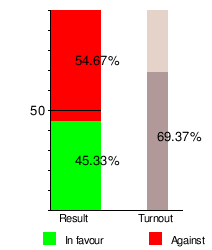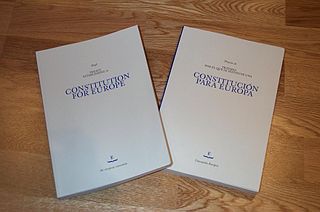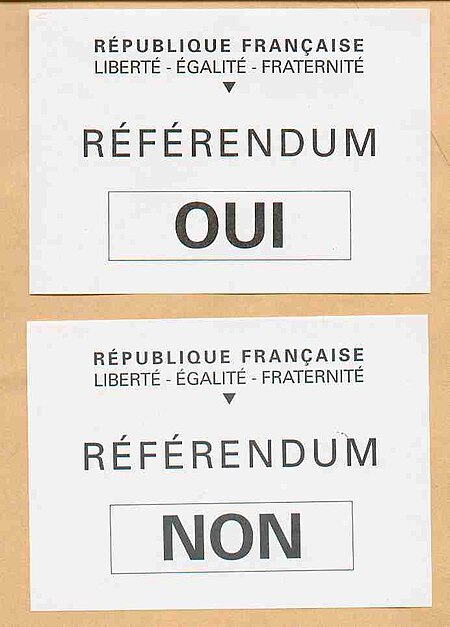
Euroscepticism means criticism of the European Union (EU) and European integration. It ranges from those who oppose some EU institutions and policies and seek reform, to those who oppose EU membership outright and see the EU as unreformable. The opposite of Euroscepticism is known as pro-Europeanism.

The Treaty of Nice was signed by European leaders on 26 February 2001 and came into force on 1 February 2003.

A referendum was expected to take place in the United Kingdom in 2006 to decide whether the country should ratify the proposed Treaty establishing a Constitution for Europe. However, following the rejection of the Constitution by similar referendums in France in May 2005 and the Netherlands in June 2005, the UK vote was postponed indefinitely. The question was rendered moot when the constitution was superseded by the Treaty of Lisbon, which Parliament ratified in 2008 without holding a referendum.

The United Kingdom European Communities membership referendum, also known variously as the Referendum on the European Community , the Common Market referendum and EEC membership referendum, took place under the provisions of the Referendum Act 1975 on 5 June 1975 in the United Kingdom to gauge support for the country's continued membership of the European Communities (EC) — often known at the time as the ‘European Community’ and the ’Common Market’ — which it had entered two and a half years earlier on 1 January 1973 under the Conservative government of Edward Heath. Labour's manifesto for the October 1974 general election had promised that the people would decide ’through the ballot box’ whether to remain in the EC.
The Twenty-sixth Amendment of the Constitution Act 2002 is an amendment of the Constitution of Ireland which permitted the state to ratify the Treaty of Nice. It was approved by referendum on 19 October 2002 and signed into law on 7 November of the same year. The amendment followed a previous failed attempt to approve the Nice Treaty which was rejected in the first Nice referendum held in 2001.

This is a list of referendums related to the European Union, or referendums related to the European Communities, which were predecessors of the European Union. Since 1972, a total of 48 referendums have been held by EU member states, candidate states, and their territories, with several additional referendums held in countries outside of the EU. The referendums have been held most commonly on the subject of whether to become a member of European Union as part of the accession process, although the EU does not require any candidate country to hold a referendum to approve membership or as part of treaty ratification. Other EU-related referendums have been held on the adoption of the euro and on participation in other EU-related policies.

A referendum on the treaty establishing a Constitution for Europe was held in Spain on 20 February 2005. The consultative referendum on ratification of the proposed Constitution of the European Union was approved by 81.8% of voters, although turnout was just 41.8%, the lowest since the end of the Franco era.

A consultative referendum on the Treaty establishing a Constitution for Europe was held in the Netherlands on 1 June 2005 to decide whether the government should ratify the proposed Constitution of the European Union. The result was a "No"-vote.
The Czech referendum on the Treaty establishing a Constitution for Europe was expected to take place in 2006 to decide whether the Czech Republic should ratify the proposed Constitution of the European Union. Following the rejection of the Constitution by voters in France and the Netherlands, the Czech government announced that the proposed referendum would not be held.
The Luxembourgish referendum on the Treaty establishing a Constitution for Europe is a referendum that was held on 10 July 2005 to decide whether Luxembourg should ratify the proposed Constitution of the European Union.
The Irish referendum on the Treaty establishing a Constitution for Europe was a vote that was planned but did not occur. The referendum was expected to take place in 2005 or 2006 to decide whether Ireland should ratify the proposed EU Constitution. Following the rejection of the Constitution by voters in the French referendum of May 2005 and the Dutch referendum of June 2005, the planned Irish referendum was postponed indefinitely.
The Polish referendum on the Treaty establishing a Constitution for Europe was a referendum expected to be held on in October 2005 to decide whether Poland should ratify the proposed Constitution of the European Union. After the rejection of the constitution by France and the Netherlands the referendum was cancelled.
The Danish referendum on the Treaty establishing a Constitution for Europe was a planned referendum to be held on 27 September 2005, that would have put the proposed Constitution to the voters of Denmark for ratification. However, after voters voted down the Constitution in both the French and Dutch referendums before the Danish vote could take place, Danish prime minister Anders Fogh Rasmussen indicated that the referendum would be cancelled. On April 24, 2008 the Danish parliament ratified the Treaty's successor, the Treaty of Lisbon without a referendum.

Holger Kirkholm Nielsen, known as Holger K. Nielsen, is a Danish politician, member of the Folketing for the Socialist People's Party. He was Denmark's Minister for Foreign Affairs from 12 December 2013 to 30 January 2014. He was leader of the Socialist People's Party from 1991 to 2005 and served as the Minister for Taxation from 16 October 2012 to 12 December 2013.

The Twenty-eighth Amendment of the Constitution Bill 2008 was a proposed amendment to the Constitution of Ireland that was put to a referendum in 2008. The purpose of the proposed amendment was to allow the state to ratify the Treaty of Lisbon of the European Union.

The Twenty-eighth Amendment of the Constitution Act 2009 is an amendment of the Constitution of Ireland which permitted the state to ratify the Treaty of Lisbon of the European Union. It was approved by referendum on 2 October 2009.
New World was an organized caucus in the French Socialist Party.
Campaign Against an EU Constitution (CAEUC) was a coalition left-wing political parties, organisations, trade unionists and individuals in Ireland, formed in 2005 to campaign against the anticipated European Union Constitution referendum. The Irish referendum on the issue did not materialise when the constitution was rejected in a constitutional referendum in France and a consultative referendum in the Netherlands

The ratification of the Treaty of Lisbon was officially completed by all member states of the European Union on 13 November 2009 when the Czech Republic deposited its instrument of ratification with the Italian government. The Lisbon Treaty came into force on the first day of the month following the deposition of the last instrument of ratification with the government of Italy, which was 1 December 2009.

















